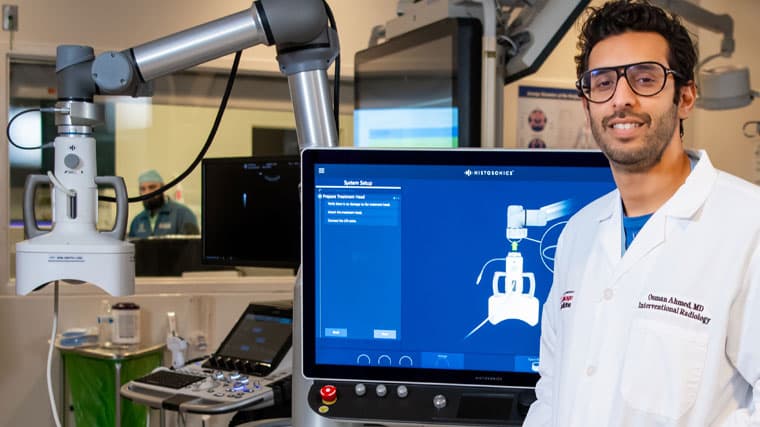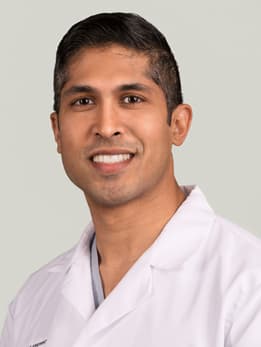Histotripsy - Liver Cancer Ultrasound
Treating Liver Tumors with Sound Waves
Histotripsy is an innovative, non-invasive treatment for liver tumors that uses a robotic machine to target and destroy cancer tissue with ultra-precise sound waves. It’s a powerful tool for doctors to treat certain tumors without any needles, radiation or surgery, even allowing most patients to go home the same day.
The University of Chicago Medicine has been involved for years in bringing histotripsy technology to patients, including conducting some of the earliest clinical trials and being among the first medical systems in the country to offer the treatment following FDA approval. As early adopters, our doctors have deep expertise with the procedure, allowing them to deliver the highest level of care.
Frequently Asked Questions About Histotripsy
What is histotripsy and how does it work?
Histotripsy is a non-invasive procedure that uses high-intensity sound waves to selectively destroy cancer tissue in the liver. The procedure uses a precise machine to generate and target sound waves that create a "bubble cloud," which disrupts and destroys only the cancerous tissue. Doctors use ultrasound imaging – like what is used to see babies in the womb – to locate the tumor, determine the size of the area that needs to be treated, and precisely target and monitor the treatment area during the procedure.
What are the benefits of histotripsy?
Unlike traditional methods like surgery, radiation or ablation, histotripsy does not require any incisions, radiation, needles or invasive procedures. It is also extremely precise, selectively destroying tumor tissue while sparing adjacent structures like blood vessels and bile ducts.
How does histotripsy distinguish between tumor tissue and healthy tissue?
Doctors can fine-tune settings related to the frequency of ultrasound so that it only resonates in specific structures. Additionally, histotripsy is robotic, allowing doctors to program the robot to map out the coordinates of the tumor and precisely focus the energy on targeted points, reducing the chances of damaging healthy tissue.
Who is a candidate for histotripsy?
Histotripsy is currently offered for patients with liver tumors. This includes both primary liver cancer (Hepatocellular Carcinoma or HCC) and metastatic liver tumors, such as those from colon cancer and neuroendocrine tumors. It is recommended for patients with three or fewer tumors that are less than 3 cm in size and in favorable locations for treatment.
What are the risks and side effects of histotripsy?
While histotripsy is non-invasive, it still involves tissue destruction and is subject to the same risks as other types of ablation. Complications such as bleeding and infection are possible, but the risk is felt to be lower compared to invasive treatments. The procedure requires general anesthesia, and side effects can include pain or discomfort after treatment.
Do I need to do anything to prepare for histotripsy treatment?
Your doctor may require you to follow some dietary restrictions for a specified time period before the planned histotripsy procedure.
What happens during a histotripsy procedure?
Patients are placed under general anesthesia to ensure minimal movement and to prevent respiratory issues. The part of the histotripsy machine that generates sound waves is placed inside a soft, flexible membrane containing specially treated water that sits on the patient’s abdomen and allows the sound waves to travel to the targeted tissue. The actual histotripsy treatment can take 5-30 minutes depending on the size of the tumor.
What happens after a histotripsy procedure?
You may feel some pain after treatment depending on the area treated, but there are no scars or incision wounds, and patients can often return to normal activities quickly. Whether or not you need to stay overnight in the hospital after the procedure depends on several factors, including whether you are experiencing any pain. Your doctor will decide based on your individual situation and determine when you return for follow-up. Over time, the destroyed tissue will be gradually replaced with healthy liver tissue.
What if histotripsy is not right for me?
At UChicago Medicine, we offer a wide range of options for cancer treatment, and our experts will work together to determine the best approach for each patient. Alternative treatments include chemotherapy, immunotherapy, surgery, hepatic artery infusion therapy (HAI), transarterial radioembolization (TARE) and ablation.
What is the future of histotripsy?
Results from histotripsy clinical trials have been impressive, but the treatment is still relatively new and requires more research. Studying patients who participated in histotripsy clinical trials over time will provide more information about the treatment and its long-term effectiveness. UChicago Medicine is actively involved in ongoing histotripsy research. Our goal is to stay at the forefront of medical innovation and continue to expand the applications of this technology to realize its full potential.
Why should I choose UChicago Medicine for liver tumor treatment?
UChicago Medicine is at the forefront of care and discovery in the prevention, diagnosis and treatment of cancer. Our more than 200 oncology experts work in teams to provide a multidisciplinary approach and personalized care for each patient, and our patients have access to more cancer clinical trials than any other hospital in the region.
We are a National Cancer Institute (NCI) Comprehensive Cancer Center — the gold standard for cancer programs that is earned by the nation’s top cancer centers in recognition of innovative research and advanced treatments. As a leading center for phase 1 and other early-phase clinical trials, our physician-scientists are creating new treatment protocols that later become the standard of care elsewhere.
When it comes to histotripsy technology, our experts have extensive knowledge and experience with the procedure. We were among the first institutions to conduct human trials. Our patient outreach efforts and participation in clinical trials demonstrate our commitment to offering the most advanced and effective treatments to our patients.
Histotripsy: What Is It and How Does It Work?
[MUSIC PLAYING] Histotripsy is a new, non-invasive technology that uses focused ultrasound waves to target and destroy cancer tissue in the liver. When the ultrasound waves are transmitted through the body and reach the targeted tissue, they cause vibrations that create high pressure. This pressure creates tiny, naturally-occurring gas bubbles known as microbubbles.
These microbubbles expand and collapse very quickly, forming a bubble cloud that moves through the targeted tissue directed by the histotripsy machine. The expansion, collapse, and vibrations make the cancer cells break apart completely. This destruction only happens inside the bubble cloud avoiding damage to tissue that is not targeted. Research indicates that important structures like blood vessels are strong enough to remain intact even as surrounding cancer tissue is destroyed.
[MUSIC PLAYING]
Unlike conventional therapies, histotripsy only uses mechanical forces rather than chemicals, surgery, or radiation to destroy cancer tissue. As a result, it doesn't create heat or ions that damage healthy DNA, and it preserves antigens-- molecules that help the immune system recognize any remaining cancer cells for cleanup.
When the cancer cells are destroyed, they leave behind a harmless liquid that gets absorbed and flushed out by the body's natural drainage systems. In weeks and months that follow, the volume of unwanted tissue shrinks. At UChicago Medicine, we have specialized equipment that allows physicians to combine their expertise with robotic precision to plan the ultrasonic wave treatment and monitor it in real time. The histotripsy procedure for removing liver tumors is completely non-invasive, offering the potential to transform the patient experience.
[MUSIC PLAYING]
Our Histotripsy Physicians
UChicago Medicine among the first to offer histotripsy for liver tumors

Convenient Locations for Cancer Care
Request an Appointment for Cancer Care
We are currently experiencing a high volume of inquiries, leading to delayed response times. For faster assistance, please call 1-855-702-8222 to schedule your appointment.
If you have symptoms of an urgent nature, please call your doctor or go to the emergency room immediately.
To refer a patient for cancer care, please call UCM Physician Connect at 1-800-824-2282.
* Indicates required field


